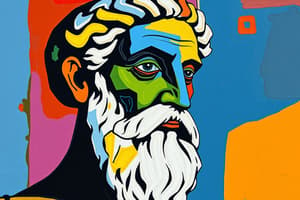Podcast
Questions and Answers
What is the primary way that love is expressed, according to some scholars?
What is the primary way that love is expressed, according to some scholars?
- Through the exchange of material gifts
- Through physical touch and gestures
- Through the creation of art and music
- Through language, such as poetry or music (correct)
What is the key aspect of romantic love that is often observed?
What is the key aspect of romantic love that is often observed?
- Fleeting feelings of passion and desire
- Strictly physical and sexual relationships
- Indifference and lack of emotional attachment
- Strong emotional attachment and lifelong partnerships (correct)
Which hormone is associated with the desire for sexual gratification and reproduction?
Which hormone is associated with the desire for sexual gratification and reproduction?
- Norepinephrine
- Oxytocin
- Dopamine
- Estrogen and testosterone (correct)
What is the role of oxytocin and vasopressin in the development and maintenance of love?
What is the role of oxytocin and vasopressin in the development and maintenance of love?
How is love portrayed in cultures worldwide, according to the text?
How is love portrayed in cultures worldwide, according to the text?
Study Notes
Introduction
Love is a multifaceted concept that has captivated individuals throughout history. It is a universal experience that transcends borders, cultures, and languages. Love encompasses a wide range of emotions, from romantic attachment to familial affection and platonic connections. Despite its ubiquity, the nature of love remains subjective and mysterious, prompting philosophers, scientists, and artists to explore its depths. This article examines the various aspects of love, delving into its philosophical underpinnings, scientific explanations, and cultural expressions.
Philosophical Perspectives on Love
Philosophers have explored the nature of love for centuries, providing diverse interpretations of its essence. Plato's dialogue "Symposium," for instance, posits love as a series of elevations, where base desires give way to higher forms of love, eventually culminating in divine love. Other philosophical traditions view love as a means of understanding oneself and the world, serving as a mirror reflecting the deepest truths within an individual.
Eros, Philia, and Agape
Plato proposed three types of love: Eros (eros), Philia (friendship), and Agape (divine love). Eros represents romantic or sexual love, Philia denotes friendships based on reciprocal affection, and Agape refers to the highest form of love, associated with universal benevolence and unity.
The Nature of Love: Further Conceptual Considerations
In addition to philosophical theories, love has been studied from an anthropological perspective, revealing its presence across cultures and historical periods. Some scholars argue that love is primarily an expression of states of affairs towards a beloved, which can manifest through language (such as poetry or music) or behaviors (like bringing gifts).
Romantic Love
Romantic love, characterized by feelings of passion and intense longing, has been identified as a key aspect of human relationships. This form of love is often marked by strong emotional attachment and can lead to lifelong partnerships and marriages.
Love in Literature and Art
Love has been a recurring theme in literature, inspiring countless works that explore its intricacies and complexities. Poets, writers, and musicians have expressed their perspectives on love, contributing to its widespread appeal and endurance as a timeless subject.
Scientific Interpretations of Love
Scientific research has attempted to explain the biological basis of love, focusing on the role of hormones and neurochemicals in shaping attachment and bonding:
Lust
Lust, driven by hormones such as estrogen and testosterone, is associated with the desire for sexual gratification and reproduction.
Attraction
Attraction is influenced by dopamine and norepinephrine, which contribute to feelings of elation, energy, and euphoria.
Attachment
Emotional bonding in long-term relationships is facilitated by oxytocin and vasopressin.
These physiological processes play a critical role in the development and maintenance of love, particularly in the early stages of a romantic relationship.
Cultural Expressions of Love
Cultures worldwide have celebrated and portrayed love in various ways, reflecting its significance in human societies. From literature and art to rituals and celebrations, love is an essential component of human identity and social interaction.
Conclusion
Love is a dynamic concept that permeates every facet of human existence. Whether viewed through the lens of philosophy, science, or culture, love continues to inspire wonder and curiosity. Its ability to bring people closer together, fostering empathy and understanding, underscores its crucial role in shaping our world.
Studying That Suits You
Use AI to generate personalized quizzes and flashcards to suit your learning preferences.
Description
Delve into the multifaceted nature of love through philosophical interpretations, scientific explanations, and cultural expressions. Explore the essence of romantic attachment, familial affection, and platonic connections. Unravel the mysteries of love as it transcends borders, cultures, and languages.




